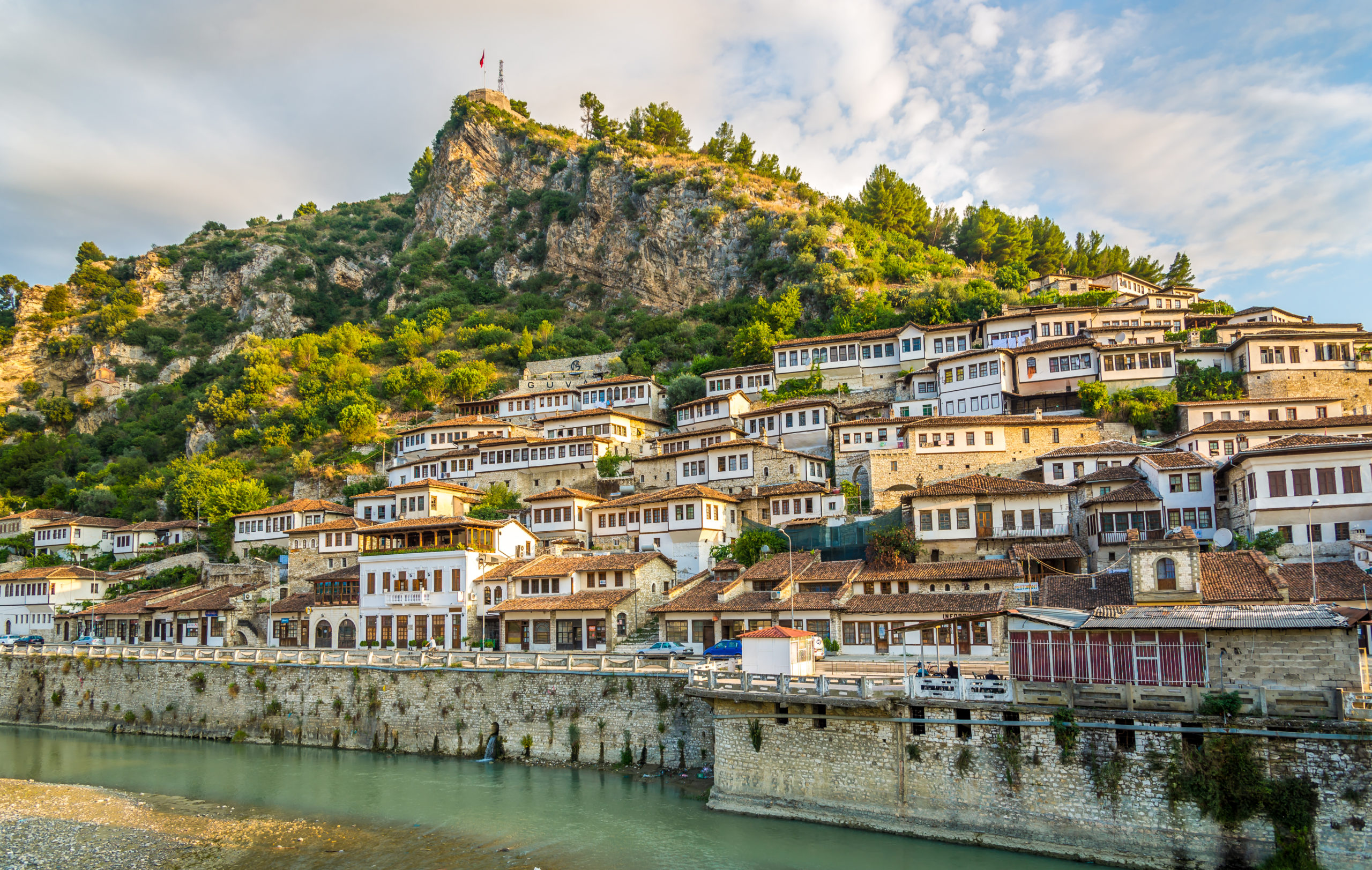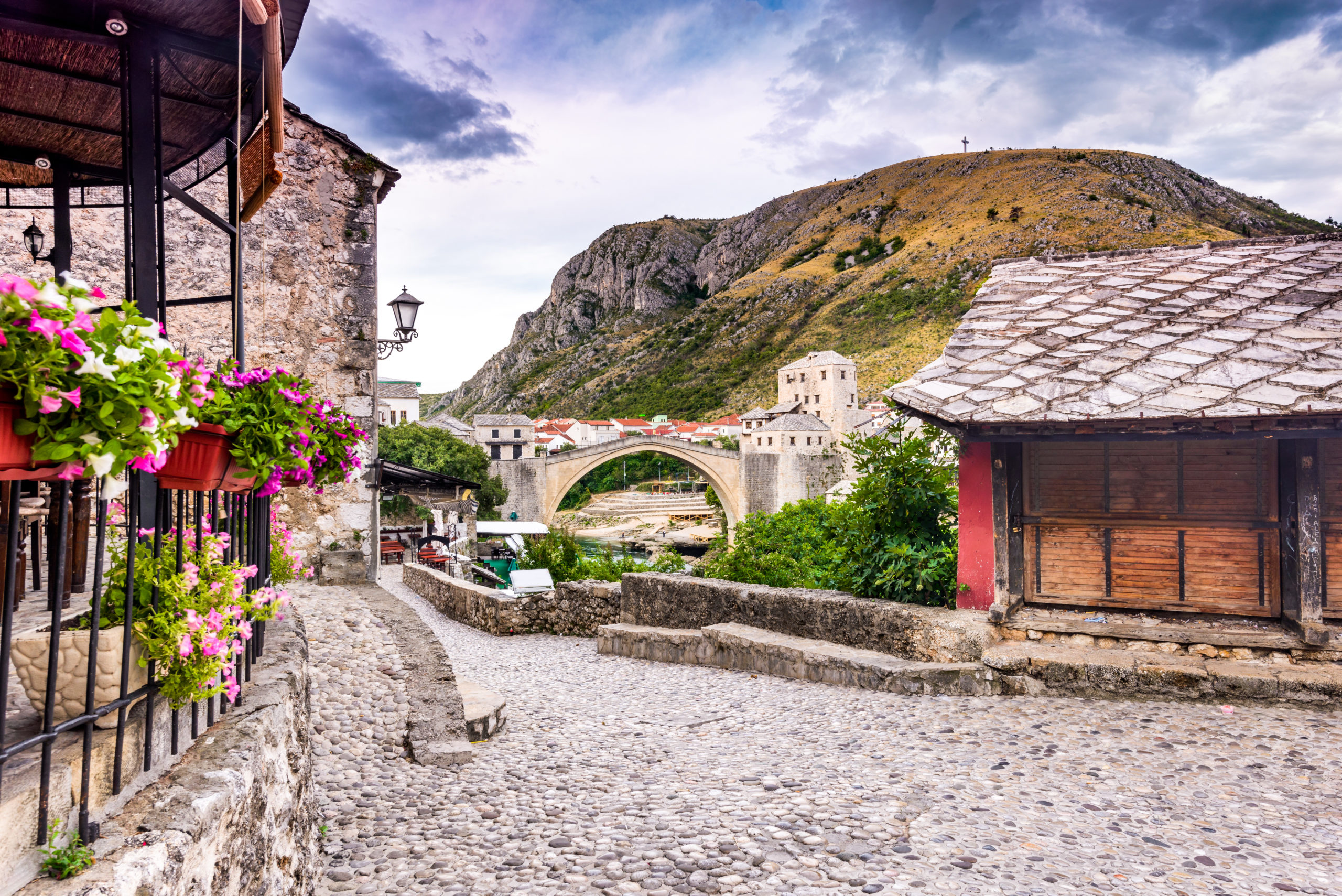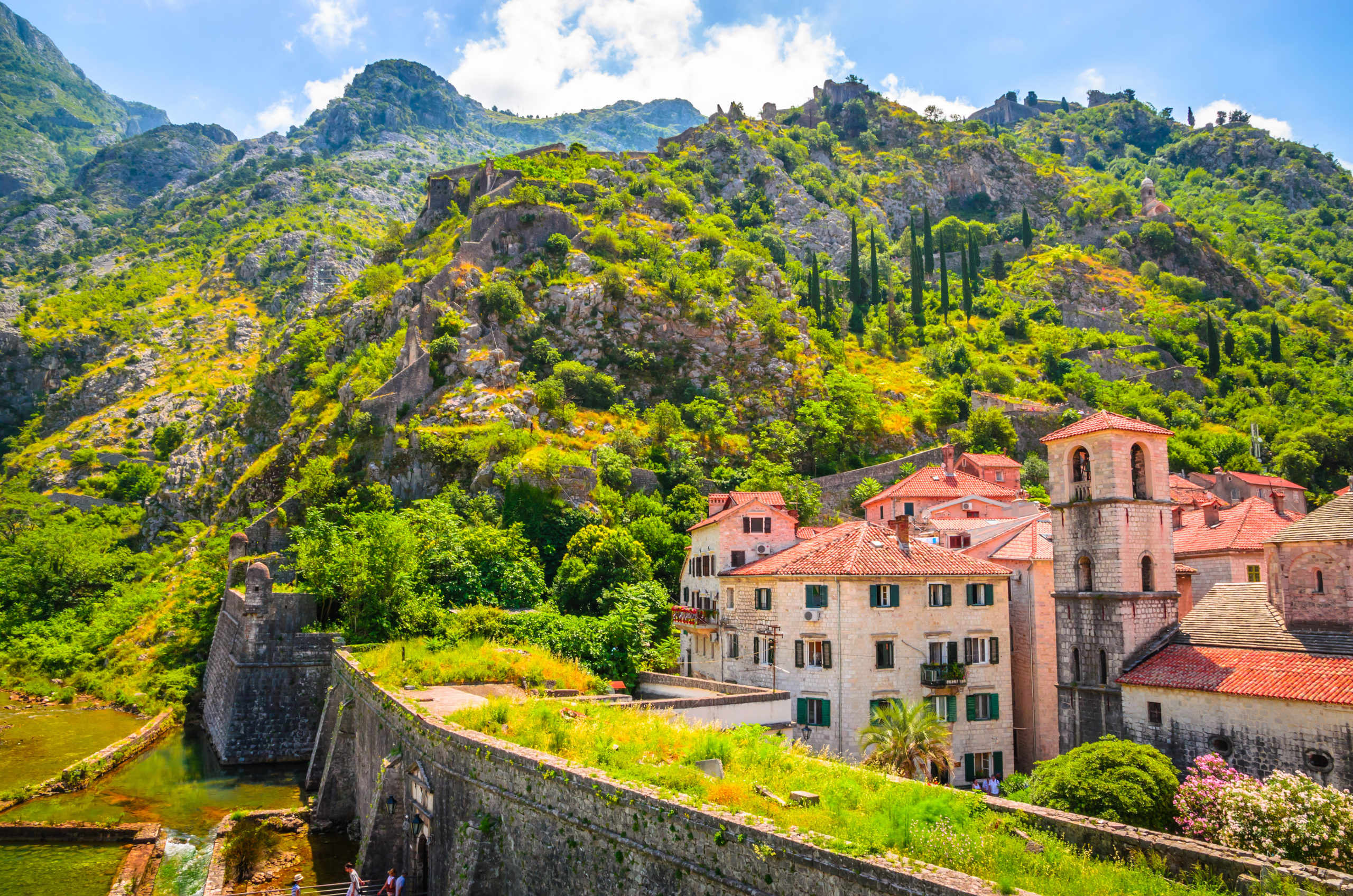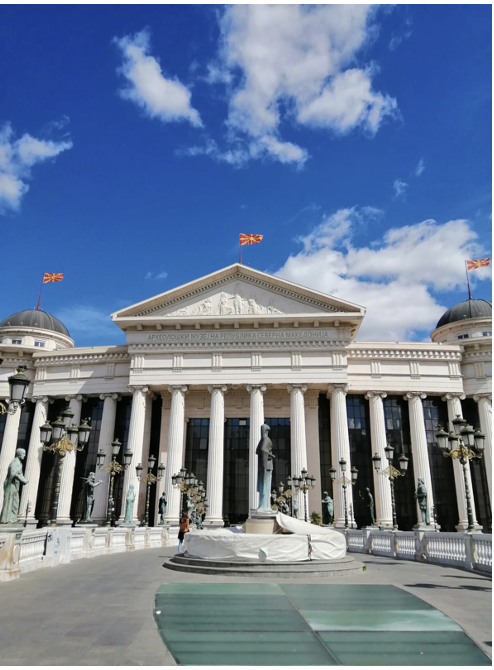Strategic Analysis Balkan Brief
Second half of April 2023
Petra Bošková, Chiara Mihalčatinová, Adam Németh, Barbora Tomanová, Victoria Maria Širocká, Zuzana Šmilňáková. Matej Jadroň, Victoria Valová, Tibor Čech
Albania

Old City Berat, Albania. Photo: Shutterstock.com
Socialist Party Candidate’s Son Accused of Vote Buying in Albania Election
Vote buying in Albania has been documented on numerous occasions. According to several reports from international election observers, election fraud has been routinely reported in the country. Senior party figures, such as ministers, mayors, and members of the Parliament, are believed to have been involved in such fraud over the past few years. Not only did officials allegedly involved in fraud earn promotions, but their crimes have also been met with impunity. This raises concerns regarding Albania’s commitment to upholding the rule of law, as no arrests have taken place, nor has any of the cases been brought before a court.
Ahead of the upcoming mayoral elections, scheduled to take place on May 14, 2023, the opposition has accused the ruling socialists of vote-buying. A private minivan was recently blocked by opposition activists supporting Myftar Dauti – an opposition candidate for the post of mayor. The activists were accusing the driver of transporting packages tagged “Rezerva Materiale Shtetërore”, which stands for “State Material Reserves”. The opposition claimed the respective packages were being used on behalf of the Socialist candidate with the purpose of bribing the constituency. In other words, the opposition accused the Socialists of taking resources from the state reserve with the intention of vote-buying.
As was later discovered, once the prosecution authorised the Police to access the vehicle, 21 packages with the marking “Rezerva Materiale Shtetërore” were discovered. Akil Kraja, a member of the opposition from “Bashke Fitojme”, stated that these findings are clear proof of an electoral crime.
Interestingly, the son of Halit Mulaj, the incumbent Socialist, was found in the minivan, along with the 21 packages of State Resources. Mulaj asserted the incident was a misunderstanding and his son was merely “transporting packages from the warehouse to the municipality” as part of Qadr Night, a holy night in Islam. Allegedly, the packages were meant to be given away to families in need during Qadr Night.
Nevertheless, members of the opposition claim evidence that such action was not exceptional or unprecedented. In order to determine whether to file charges or not, the chief prosecutor for the region, Xhevahir Lita, has yet to analyse the evidence.
Sources:
- Blerina Gjoka, Balkan Insight, „Socialist Party Candidate’s Son Accused of Vote Buying in Albania Election“, https://balkaninsight.com/2023/04/19/the-son-of-socialist-candidate-accused-for-vote-buying-in-albanias-local-election/
Disputes with ICSID ruling
Albania’s Prime Minister Edi Rama and his cabinet is strongly disagreeing with a decision ruled by the International Centre for the Settlement of Investment Disputes (ICSID). The ruling was in the case of Italian businessman Francesco Bechetti vs. Albania. Francesco Bechetti sued Albania after he was accused of money laundering in 2014. All his assets were seized by the government for a total of 110 million €. He was sentenced to 17 years in prison in absentia. The ICSID ruled that Albania should compensate him for a total of 110 million €. A similar story is currently happening with a German company, EMS Shipping and Trade, that has filed a lawsuit against Albania within ICSID organs.
As a reaction to this, Albania’s Justice Minister, Ulsi Manja, drafted and presented a draft law on Thursday to establish a local court to deal with commercial disputes within the country. This was followed by the PM, who proposed the idea that Albania would leave the ICSID.
ICSID is the main arbitration body of the World Bank Group and was created to rule in case of legal disputes and conciliation between international investors and states. PM thinks that: “We are analysing the possibility of leaving the jurisdiction [of arbitration courts] altogether because what has happened is scandalous “. A new local court would enable easier settlement of business disputes with each other or the state.
If this decision will be final is not sure yet, however, if yes, this would put a risk on the investors and their assets, and it could deter future investments in the country. It is important to note that this would mean that Albania will not implement ISCID ruling only in case the disputes cannot be solved through Albanian legislation. And at the same time, when the implementation of the ruling would not go against public order. The current situation is also not very bright for the future, as according to local media, Albania is still being sued in another ten cases.
Sources:
- Sinoruka Fjori, Balkan Insight, „Albania Moves to Establish Local Arbitration Court to Replace ICSID“, in: https://balkaninsight.com/2023/04/21/albania-moves-to-establish-local-arbitration-court-to-replace-icsid/.
- Taylor Alice, Euractiv, “Germany company sues Albania over the controversial port project”, in: https://www.euractiv.com/section/politics/news/germany-company-sues-albania-over-controversial-port-project/.
Bosnia and Herzegovina
A new era between the Balkans and the Caucasus?
The President of Azerbaijan, Ilham Aliyev, arrived on April 13 for his first official visit to Bosnia and Herzegovina. On this occasion, the countries signed a Joint Declaration on the Strategic Partnership in Sarajevo, marking a new era in bilateral relations.
The head of Azerbaijan visited a Balkan country at the invitation of the Bosna and Herzegovina Presidency Chairperson, Željka Cvijanović, who paid a state visit to Baku on March 1. Both state visits aimed to strengthen economic cooperation, especially in the energy field. Bosnia and Herzegovina have repeatedly expressed its ambition to gain access to Azerbaijani fossils as it would significantly reduce its dependence on Russian gas. The country is especially interested in Ionian Adriatic Pipeline that can be connected to the Southern gas Corridor, providing 5bcm of gas per year. Furthermore, a desire for cooperation in the field of renewable energy was also demonstrated, and joint research on hydropower is soon to be conducted.
The state visit further enhanced diplomatic relations that go way back to 1995. As it was announced by Cvijanović after a meeting with Aliyev, the Embassy of Bosnia and Herzegovina will shortly open in Baku, enabling direct diplomatic contact between countries. Cooperation in trade, tourism, science, and culture was also discussed, and the Bosnia and Herzegovina Presidency members expressed their gratitude towards Azerbaijan’s consistent support. It is therefore expected that the bilateral relations will lead to establishing a stable partnership built on mutually expressed interests.
Sources:
- SarajevoTimes, ,,President of Azerbaijan Ilham Aliyev Today on an Official Visit to BiH“, https://sarajevotimes.com/president-of-azerbaijan-ilham-aliyev-is-in-bih-today/
- Talha Ozturk, AA, ,,Azerbaijan, Bosnia hail’ new era’ in bilateral relations“, https://www.aa.com.tr/en/europe/azerbaijan-bosnia-hail-new-era-in-bilateral-relations/2871448

Mostar, Bosnia and Herzegovina. Photo. Shutterstock.com
Kosovo
European Parliament approves visa liberalisation with Kosovo.
On April 18,2023, the European Parliament (EP) approved the agreement on visa freedom with Kosovo. It means that Kosovo passport holders will be able to travel to the EU without visas for 90 days in any 180 days. The abolition of the visa requirement for Kosovo will take effect on January 1, 2024. On April 19, the President of the European Parliament, Roberta Metsola, and Jessika Rosëall, the Swedish minister of the EU, representing the presidency of the Council of the EU, signed the law.
Kosovo already met all the requirements to secure visa-free travel in 2018. However, some of the non-recognising states of Kosovo’s independence have been holding up the approval process, as well as states like France and the Netherlands that were concerned about potential migration problems.
The EP approved the agreement on visa-free liberalisation for Kosovo, although it has not yet fulfilled all its obligations, including the creation of the Association of Serbian Municipalities resulting from the Brussels Agreement (2013) and renewed in the Ohrid Agreement (2023). It is worth mentioning that Kosovo is the only part of the Western Balkans that does not have visa-free relations with the Schengen area.
From Serbia’s point of view, the Chairperson for the Commission for European Integration of the Parliament of Serbia, Elvira Kovac, said, „Kosovo is being rewarded while the EU is punishing Serbia in the context of the ongoing Belgrade-Prishtina EU-facilitated dialogue. One side receives a prize, while the other waits two years to open a new cluster,” she said regarding Serbia’s EU accession path.“
On the other hand, Kosovo fully welcomed the decision of the European Parliament, and Kosovo’s President Vjosa Osmani gave credit to the citizens of Kosovo regarding visa liberalisation. “Today’s final decision on the liberalisation of visas for the citizens of Kosovo is a victory, not only for our country but for democracy itself and unity in Europe. This decision is the merit of the people of Kosovo, the unparalleled determination shown throughout the years, despite various delays and injustices,” Osmani said.
Despite the approval of visa liberalisation by the European Parliament, citizens with a Kosovar passport will have to be subject to a visa requirement when entering the Spanish territory. Spain still does not recognise the Republic of Kosovo as an independent country, and unlike some of the other non-recognisers, it does not recognise either passports issued by the Kosovo authorities.
Sources:
- Janne OJAMO, European Parliament News, „MEPs approve visa liberalisation with Kosovo“,https://www.europarl.europa.eu/news/en/press-room/20230414IPR80117/meps-approve-visa-liberalisation-with-kosovo
- Schengen visa News, „EU Parliament Gives Final Green Light on Visa Liberalisation With Kosovo – Agreement to Be Signed Tomorrow“, https://www.schengenvisainfo.com/news/eu-parliament-gives-final-green-light-on-visa-liberalisation-with-kosovo-agreement-to-be-signed-tomorrow/
- Alice Taylor, Euractiv, „Kosovo visa liberalisation causes stir in Belgrade“, https://www.euractiv.com/section/politics/news/kosovo-visa-liberalisation-causes-stir-in-belgrade/
- Schengen visa News, „Serbia Unhappy With Kosovo Visa Liberalisation“, https://www.schengenvisainfo.com/news/serbia-unhappy-with-kosovo-visa-liberalisation/
- Schengen visa News, „Spain Won’t Apply Visa Liberalisation for Kosovo Citizens Despite EU Agreement“, https://www.schengenvisainfo.com/news/spain-wont-apply-visa-liberalisation-for-kosovo-citizens-despite-eu-agreement/
Croatia
Victims’ Representatives joined Croatian Politicians at the Commemoration of the Jasenovac Death Camp Victims
Croatian politicians commemorated the 78th anniversary of the Jasenovac death camp inmates’ release. The ceremony, held on April 23, was joined by the representatives of the victims, including Serbs, Jews, Roma, and Croatian anti-fascists. Prime Minister Plenković expressed his satisfaction with the decision of the important delegates to join the shared event with the parliamentarians. This marks a turning point in the attitude of the victims’ representatives, who organised separate commemoration ceremonies over the past seven years because they were dissatisfied with government policies regarding the legacy of Croatia’s fascist Ustasha regime.
The Jasenovac concentration and extermination camp functioned between 1941 and 1945 under the fascist Ustasha regime that ruled the Independent State of Croatia. It became infamous for its exceptional cruelty after the forensic investigations conducted after WWII had shown that victims were oftentimes murdered with knives and hammers facing their murderer. The site has become a target for historical revisionists who deny the scope of atrocities committed there.
Just two days before the commemoration, the Croatian Parliament voted in favour of increasing fines for shouting the Ustasha salute and displaying the regime’s symbols from 700 to 4.000 EUR. Although an improvement, this step was still perceived by the President of the Jewish Municipality of Zagreb as insufficient since he called for the reclassification of such an action into a criminal offense.
Echoing the same opinion during his speech at the commemoration, Ognjen Kraus, from the Croatian Organization of Jewish Municipalities, criticised historical revisionism concerning Jasenovac and other Ustasha camps alongside the inability of the Croatian Parliament to criminalise the display of Ustasha salute and symbols. He also blamed the parliamentary representatives of Serbian and Roma minorities, who, in his opinion, show a lack of commitment to the changes in the criminal code. Ognjen Kraus has been outspoken about this issue and voiced similar statements at the Holocaust memorial ceremony this year.
Criticism directed at the Croatian politicians comes amidst Croatia’s chairmanship of the International Holocaust Remembrance Alliance (IHRA). The government adopted IHRA’s Working Definition of Anti-Semitism at the beginning of 2023. While currently unable to push for more significant change, Prime Minister Plenković at least criticised the opposition politicians who are hindering the legislative process concerning stricter sanctions on the “Ustasha-philia”.
Sources:
- Vuk Tesija, Balkan Insight, “At Croatia’s Jasenovac Camp, Face-to-Face with Horror”, https://balkaninsight.com/2023/04/21/at-croatias-jasenovac-camp-face-to-face-with-horror/
- Al Jazeera Balkans, “Državni vrh i predstavnici manjina odali počast stradalima u Jasenovcu”, https://balkans.aljazeera.net/news/balkan/2023/4/23/zajednicka-komemoracija-manjina-i-vlasti-u-jasenovcu
- Enis Zebić, Radio Slobodna Evropa, “Ovog puta svi zajedno na komemoraciji u Jasenovcu”, https://www.slobodnaevropa.org/a/hrvatska-komemoracija-jasenovac/32373950.html
- Jutarnji List, “Ognjen Kraus u Jasenovcu prozvao Pupovca i Kajtazija: ‘Nisu nas podržali, a slao sam i pismo…‘”, https://www.jutarnji.hr/vijesti/hrvatska/ognjen-kraus-u-jasenovcu-prozvao-pupovca-i-kajtazija-nisu-nas-podrzali-a-slao-sam-i-pismo-15328637#google_vignette

Kotor, Montenegro. Photo: Shutterstock.com
Montenegro
From Cetinje to Podgorica: The election of a new president brings security concerns
On April 18, Montenegro’s interior minister said that the new president, Jakov Milatovic, would not be inaugurated in the old royal capital Cetinje, as is traditional, because of security concerns about possible opposition protests. Instead, it would be held in the capital Podgorica.
However, fears of possible protests are well justified as a group of supporters of pro-Montenegro organisations attacked Milatovic on March 17 before the second round of the elections in an attempt to prevent him from attending the electoral convention in Cetinje.
It seems that a significant number of citizens in Cetinje do not approve of Milatovic’s policies, so he could be in trouble during the inauguration.
Milan Knezevic, one of the leaders of the Democratic Front, which is part of the ruling alliance, said the authorities should be able to provide security for state officials in every town in Montenegro.
The Europe Now candidate, Jakov Milatovic, won the second round of the presidential elections, which took place on April 2, by a large margin against incumbent Milo Djukanovic, the leader of the Democratic Socialist Party.
The inauguration is scheduled for May 20 2023, with President-elect Milatovic having already decided that he wants to be inaugurated in Podgorica precisely because of security reasons.
Sources:
- Samir Kajosevic, „Montenegro Mulls Moving Presidential Inauguration Amid Protest Fears“, https://balkaninsight.com/2023/04/18/montenegro-mulls-moving-presidential-inauguration-amid-protest-fears/

Skopje, North Macedonia.
North Macedonia
Controversies Surrounding North Macedonia’s Highway Plans
North Macedonia is on track to substantially expand its highway network. The plan of the government led by the Social Democrats is to overcome the reputation of a country in which infrastructure projects are always finished only after major delays and major cost increases. That is why the government decided to speed up the whole bureaucratic process surrounding construction works and sign a direct contract with the Bechtel-ENKA consortium after reaching a strategic partnership with this US-Turkish consortium. They will have little over four years to construct four crucial segments of highway corridors for a price of over 1.3 billion EUR. These highways will form parts of Pan-European corridors number 8 and 10 that stretch from the Adriatic to the Black Sea and from Austria to Greece, respectively.
However, these fast-tracked plans come with doubts and opposition from various sides as the project comes with nine legislative changes. The Laws on Cultural Heritage, Construction, Agricultural Land, Expropriation, Urban Planning, Mineral Resources, Forests, Labour, and Strategic Partnership with Bechtel-ENKA are to be amended. The amendments that raise the most controversies are the ones on the Law on Cultural Heritage and the Law on Labour. The latter would create a legal exception and oblige construction workers to work up to 60 hours a week on-site. It drew criticism from some of the major trade unions, but it did not stop the government from passing the amendment shortly after, along with all the other proposed changes but the one on cultural heritage.
This proposed amendment states that if a construction company discovers an archaeological site, it will only have to inform a supervising engineer employed by a private enterprise. Furthermore, reporting the findings to the state authorities would not be required, resulting in bypassing them. This led to a protest by the members of the Macedonian Archaeological Society, who argue that such a proposal is unacceptable, especially in a country with a vibrant archaeological history. It is unclear for now whether legislators have given up entirely on the amendment or whether they will intend to pass it later on. Nevertheless, the legal changes that have just been given the green light may be reviewed by the Constitutional Court, but the government does not seem to be willing to reconsider its plans.
Sources:
- Goce Krpkovsi, Balkan Insight, „Bumpy Roads: North Macedonia’s Fast-Tracked Controversial Highway Construction Bid„, https://balkaninsight.com/2023/03/27/bumpy-roads-north-macedonias-fast-tracked-controversial-highway-construction-bid/
Serbia
Did Serbia agree to sell weapons to Ukraine?
According to a leaked Pentagon document posted online, Serbia agreed to supply arms to Kyiv or has sent them already. Entitled “Europe|Response to Ongoing Russia-Ukraine Conflict,” the document in chart form lists the “assessed positions” of 38 European governments in response to Ukraine’s requests for military assistance. The chart demonstrated that Serbia had agreed to offer lethal aid or had already sent it but had declined to train Ukrainian forces. Additionally, it stated that Serbia had the political will and military capacity to give Ukraine weapons in the future.
Serbia, which has strong cultural and commercial ties to Russia, is one of the few European nations that has not imposed sanctions in reaction to Moscow’s invasion of Ukraine last year, and Vučić’s government has professed neutrality in the Ukraine war. Belgrade has struggled to strike a balance between these policies and its long-standing ambition to join the European Union.
This document did not leave the Serbian reaction cold. A Reuters report claiming that Serbia has transferred or intends to deploy weaponry to Ukraine is denied by the Serbian Minister of Defence, Milos Vucevic. “We have denied those falsehoods more than ten times, and here we are, we will do it again. Serbia has not, nor will it, sell weapons to the Ukrainian or Russian side, nor to the countries surrounding that conflict. Someone obviously aims to drag Serbia into that conflict, and all allegations published on that topic are false rumours”, Vucevic said in a statement. The minister seems to leave open the idea that Serbian weapons may have entered Ukraine through unrelated nations without his government’s involvement. “There is always the possibility that some weapons might mysteriously appear on the territory where there is a conflict, but it has absolutely nothing to do with Serbia”.
However, there is no verification of the document. It has been claimed that Serbian weaponry has ended up in Ukraine since Russia’s invasion, but not that Serbia transferred them there specifically.
Sources:
- Dragojlo, Balkan Insight, “Serbian Minister Dismisses US Report of Arms Exports to Ukraine”, https://balkaninsight.com/2023/04/12/serbian-minister-dismisses-us-report-of-arms-exports-to-ukraine/
- Reuters, “Exclusive: Leaked US intel document claims Serbia agreed to arm Ukraine”,https://www.reuters.com/world/leaked-us-intel-document-claims-serbia-agreed-arm-ukraine-2023-04-12/
- Washington Post,” Serbia denies it sent weapons to Ukraine, as leaked document claims”, https://www.washingtonpost.com/world/2023/04/12/serbia-weapons-ukraine-documents-leak/
- Ministry of Defence of Republic of Serbia, “Minister Vučević dismisses allegations that weapons and ammunition were delivered to Ukraine” , https://www.mod.gov.rs/eng/19961/ministar-vucevic-demantovao-navode-o-isporuci-oruzja-i-municije-ukrajini19961

Contact us